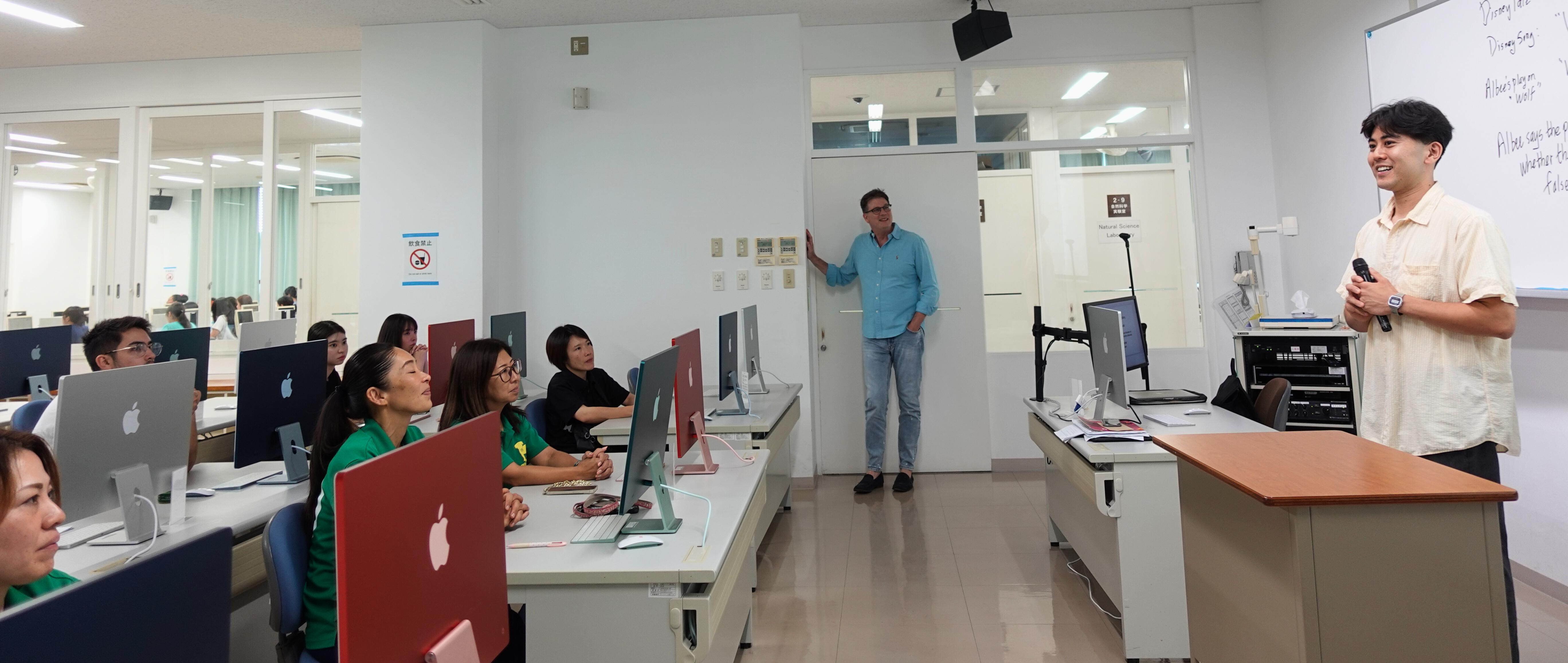イギリス オックスフォード大学博士課程在籍、Seijiro Takahashi氏による特別講義を開催しました
【掲載日】2024-07-09
 △自身の自己紹介をするSeijiro Takahashi氏
△自身の自己紹介をするSeijiro Takahashi氏
6月19日(水)、人文学部 英語コミュニケーション学科 Daniel Broudy教授の講義「Current Issues in English」において、イギリス オックスフォード大学博士課程に在籍する、Seijiro Takahashi氏がゲストスピーカーとして登壇し、特別講義を開催しました。
自身の研究の一環として、沖縄県でのフィールドワークを終えたばかりのTakahashi氏。この日は、その研究テーマをベースに「大量消費と誇示的消費行動が動物たちの扱いに与える影響」(Consumerism, Conspicuous Consumption, and The Treatment of Animals)について、講義を行いました。
講義では、自身の研究目的や研究のベースにある理論を紹介し、「大量消費社会」が生み出す問題や、そのような社会において、動物たちはどのように扱われるのかについても議論しました。また、「異文化間におけるヒトとペットやそれ以外の動物たちの関係性の違い」、「苦しみと幸福という概念」、「いい人生とは何か」、「よい人生の終末とはなにか」などのテーマについても探求しました。
Takahashi氏は、自身の研究を続けるなかで以下の疑問が新たに浮かびあがってきたと述べ、特別講義を締めくくりました。
“(1) How does itinerancy apply to other agents, including human beings?(2) What do our concepts of itinerancy indicate about our societal values?(3) How might we define “human” in the present day and age?(4) What can cultural relativity and moral relativity teach us, if anything, about ourselves?”
 △自身の研究トピックを紹介するTakahashi氏 |
 △特別講義について話すBroudy教授 |
Broudy教授は、今回の講義について「時として、より大きな組織の利益の為に、非人道的な政策や計画が実行されてしまう現代社会において、一人一人の主体性や主権について、学生自身が意識し多角的に考えるとてもよい機会となった」と話しました。
ダニエル・ブロディ教授による記事原文(英語)はコチラ
(Click here to read the original text by Professor Daniel Broudy)
Seijiro Takahashi, visiting scholar and doctoral candidate in anthropology at the University of Oxford, recently concluded his yearlong fieldwork in Okinawa. On Wednesday, June 19, Seijiro delivered a lecture titled “Consumerism, Conspicuous Consumption, and the Treatment of Animals,” to Professor Broudy’s Current Issues in English class.In the lecture, Mr. Takahashi discussed the motivations and theoretical background of his study, the new research themes that emerged during his fieldwork, and the lingering issues that surround mass consumption today and how we conceptualize and treat animals. Themes addressed in the lecture explored cross-cultural understandings of human relationships with pets and other animals, concepts of “suffering” and “happiness” as well as what it means to live a “good life” and experience a “good death.” Among the questions that emerged from his research were (1) How does itinerancy apply to other agents, including human beings? (2) What do our concepts of itinerancy indicate about our societal values? (3) How might we define “human” in the present day and age? (4) What can cultural relativity and moral relativity teach us, if anything, about ourselves? The lecture was particularly useful in raising consciousness and helping students think more critically about their own agency and sovereignty in a world dominated today by the dehumanizing policies and plans for modern societies captured by transnational pharmaceutical giants.



